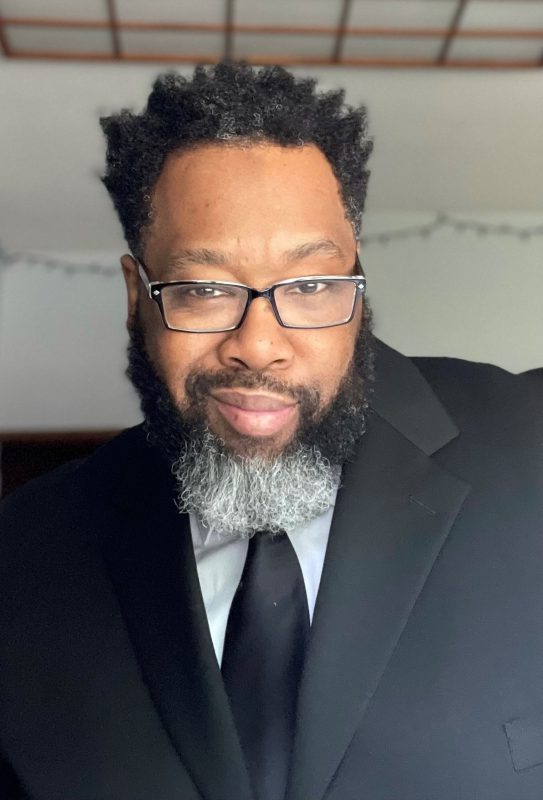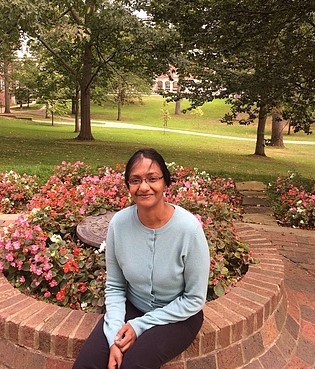Kalamazoo College is pleased to welcome the following faculty members to campus this fall:
Assistant Professor of Spanish Tris Faulkner

Tris Faulkner, who is originally from Jamaica, lived in Chile for about two years, working as a translator and interpreter at a prominent law firm before earning a Ph.D. in Spanish linguistics from Georgetown University. She also has professional experience as a translator and interpreter at the Embassy of Venezuela, and in similar roles at a legal firm and a business school in North Carolina.
Faulkner has lived in Spain and visited various Spanish-speaking countries, experiences which have helped her to observe the diversity that characterizes the Spanish language. Her research investigates the semantics and pragmatics of variation in verbal mood, tense, and aspect, as related to the Romance language family, English, and Jamaican Creole.
In addition to her Ph.D., Faulkner has master’s degrees from Georgetown (M.Sc. in Spanish linguistics) and Wake Forest University (M.A. in interpreting and translation studies), and a bachelor’s degree from Louisiana State University (B.A. in Spanish language and literature and international studies). She will teach seminars in Spanish linguistics, as well as various other courses in the upcoming academic year.
Assistant Professor of Religion Sohini Pillai

Sohini Pillai will teach courses this academic year on religious traditions in South Asia. She is a comparatist of South Asian religious literature and her area of specialization is the Mahabharata and Ramayana epic narrative traditions with a focus on retellings created in Hindi and Tamil.
Pillai is the co-editor of Many Mahabharatas (State University of New York Press, 2021), an introduction to diverse retellings of the Mahabharata tradition in the forms of classical dramas, premodern vernacular poems, regional performance traditions, commentaries, graphic novels, political essays, novels, and contemporary theater productions. She’s also a member of the Steering Committee for the Hinduism Unit at the American Academy of Religion.
Pillai has a Ph.D. in South and Southeast Asian studies from the University of California, Berkeley; a master’s degree in Middle Eastern, South Asian, and African studies from Columbia University; and a bachelor’s degree in South Asia studies and theatre studies from Wellesley College.
Assistant Professor of Theatre Quincy Thomas

Quincy Thomas earned his Ph.D. in theatre and his performance studies certification from Bowling Green State University. His research centers on subjects including counter-storytelling, Black performativity in American culture, representations of the marginalized in popular culture, comedic and solo performance and performative writing. At K, he will teach directing, theatre history and playwriting, with further prior experience teaching theatre, performance studies and film.
His courses are informed on issues of cultural marginalization and misrepresentation in the arts, specifically of racial and ethnic minorities, women and members of the LGBTQ+ community. His work has been published in peer-reviewed academic journals, including the International Review of Qualitative Research and Puppetry International, and presented at national conferences, including the Mid-America Theatre Conference, the International Congress of Qualitative Inquiry, and the Mid-Atlantic Popular and American Culture Association (MAPACA). He currently serves as president of MAPACA. His most recent directorial offering was Robert Patrick’s Play-by-Play: A Spectacle of Ourselves: A Verse Farce in Two Acts. Thomas also has a background in acting. Some of his favorite roles played include Christopher in Joe Penhall’s Blue/Orange, Albert in Bruce Norris’ Clybourne Park, and most recently the role of Actor in Nassim Soleimanpour’s White Rabbit; Red Rabbit.
Assistant Professor of Economics Darshana Udayanganie

Darshana Udayanganie earned her Ph.D., with specializations in environmental economics and college teaching, and a master’s degree in economics from the University of New Hampshire. She also has a master’s degree in resource economics and policy from the University of Maine and a bachelor’s degree from the University of Peradeniya, Sri Lanka. Before joining K in 2017 as a visiting assistant professor, she taught at Central Michigan University from 2014 to 2017, Merrimack College in 2013 and 2014, and the University of New Hampshire’s global student success program from 2011 to 2014.
Her current research focuses on urban economics and environmental economics. She also has published book chapters on economic growth in relation to military expenditure and international trade.
Assistant Professor of Japanese Brian White
Brian White will teach courses in Japanese language, literature and culture at K. He specializes in contemporary (post-1945) Japanese popular culture and media studies.
He earned his Ph.D. at the University of Chicago, where he wrote a dissertation on 1960s Japanese sci-fi literature and film, asking specifically, “What can a genre do?” He will delve into that history when he teaches a course in the winter term this year on Japanese science fiction and media history.
White earned a bachelor’s degree in East Asian languages and civilizations at the University of Pennsylvania in Philadelphia. Across his undergraduate and graduate careers, he has spent a total of two and a half years living in Japan, primarily in Tokyo, Yokohama and Kyoto.
Assistant Professor of Chinese Yanshuo Zhang
Yanshuo Zhang’s research addresses multiethnic Chinese identities in literary and visual cultures produced in China and the U.S. Her research on multiethnic Chinese cultural productions helps diversify scholarly understanding of and teaching about modern Chinese national culture.
She was a lecturer in Stanford University’s Program in Writing and Rhetoric (PWR) from 2018 through 2020, where she designed classes on cross-cultural explorations of diversity, particularly in Asia and the U.S. She also has been a post-doctoral fellow at the University of Michigan.
She earned a bachelor’s degree from St. Catherine University and a Ph.D. from Stanford University.
Visiting Assistant Professor Vijayan Sundararaj
Vijayan Sundararaj leads a biology course this term in ecology and conservation. He has prior education experience as a lecturer, teaching assistant and topic lecturer between Lakehead University in Thunder Bay, Canada, and Texas A&M University-Kingsville. His teaching interests include evolutionary ecology concepts, animal behavior, foraging behavior, predator-prey interactions, conservation biology, wildlife ecology, waterfowl ecology, mammalogy, spatial ecology, and introductory geographic information systems.
Sundararaj received a bachelor’s degree with a specialty in zoology from Gujarat University in India before earning a master’s degree in ecology from Ben-Gurion University of the Negev, Israel; a geographic information systems applications specialist graduate certificate from Sir Sandford Fleming College in Canada and a doctorate in forest sciences and wildlife ecology from Lakehead University.
Visiting Assistant Professor Eunice Uhm
Eunice Uhm specializes in modern and contemporary art, with a transnational focus on the United States and East Asia. Her work examines the conditions of migration and the diasporic aesthetic subjectivities in the works of contemporary Japanese and South Korean art from the 1960s to the present. She has previously taught courses on modern and contemporary art, East Asian art, and Asian American studies at Ohio State University. She has organized panels and presented her work on Asian American art at national conferences such as CAA. She is an active member of numerous grassroots community organizations for Asian Americans and immigrant rights, and she is involved in immigrant rights campaigns such as Love has no borders: A call for justice in our immigration system. Her essay, “Constructing Asian American Political and Aesthetic Subjectivities: Contradictions in the Works of Ruth Asawa,” is forthcoming (Verge: Studies in Global Asias, University of Minnesota Press).
Uhm received a master’s degree and a doctorate in the history of art from the Ohio State University. At K, she teaches courses on Asian and Asian American art, art and race, and transnationalism.
Visiting Assistant Professor Fungisai Musoni
Fungisai Musoni has joined the history department where she will teach courses in African civilizations, decolonization in West and Southern Africa, and U.S.-Africa relations since World War II.
Musoni has prior teaching experience in African literature, American politics and global issues, and social studies between the Ohio State University, Georgia State University, Gwinnett County Schools in Atlanta and the Zimbabwe Ministry of Education and Culture.
She fluently reads, writes and speaks the African languages of Shona and Manyika. Her education includes a bachelor’s degree in economic history and Shona from the University of Zimbabwe, Harare; master’s degrees in political science and history from Georgia State University and Mercer University respectively; and a doctorate in African American and African Studies from the Ohio State University.
Visiting Assistant Professor Badru-Deen Barry
Badru-Deen Barry teaches Introductory chemistry and biochemistry at K this fall.
His education includes a bachelor’s degree in chemistry from Fourah Bay College in Freetown, Sierra Leone, master’s degrees in chemistry from Northeast Normal University in China and Michigan State University, and a doctorate in chemistry from Michigan State.
He previously served Michigan State and Northeast Normal as a graduate research assistant, Société Générale de Surveillance in Freetown, Sierra Leone, as port supervisor and chemist, and Fourah Bay College as a laboratory and teaching assistant.
Visiting Assistant Professor Mikela Zhezha-Thaumanavar
Mikela Zhezha-Thaumanavar is teaching courses in Spanish this fall as well as a course in foreign language teaching methods. In addition, she serves as the coordinator for the Spanish Teaching Assistants at K. She received her bachelor’s degree, master’s degree and doctorate in Spanish linguistics from Western Michigan University.
She has previously taught courses in Spanish at Western Michigan University, Davenport University, and Kalamazoo Community College. She also served WMU as a guest professor, teaching in the institution’s Summer Translation Program. She previously has worked in translation and speaks Albanian and Italian in addition to English and Spanish.
Visiting Assistant Professor Jennifer Mills
Jennifer Mills is leading courses including seminars in psychology and health psychology this term. Mills holds a bachelor’s degree from the University of Georgia, master’s degrees from Georgia College and State University and Western Michigan University, and a doctorate from WMU.
She is working on an executive master’s in public health at Emory University with an emphasis in prevention science. For the past 10 years, Mills has owned and operated MindBodyWell, a private counseling practice that focuses on science-based approaches to stress, depression and anxiety.
Mills is an active member of the Institute for Public Scholarship, a local, anti-racist organization that works on issues of place and belonging. Her research interests focus on preventing and mitigating the impact of early childhood adversity on health.
Visiting Assistant Professor Robert Mowry
Robert Mowry is teaching two sections of Introduction to Society and Culture offered by the Department of Anthropology and Sociology. His additional teaching interests include quantitative methods, disaster, the intersection of politics and the environment, and ways of seeing and knowing.
Mowry comes to Kalamazoo College from the University of Notre Dame, where he recently earned his Ph.D. in sociology. Previously, he earned master’s degrees from the University of Notre Dame and the University of Sheffield, and a B.A. from Earlham College.
As a teacher-scholar of disaster and politics, Mowry employs multiple methods to study the processes and outcomes of globally diverse, high-stakes political arenas—from post-disaster contentious politics in the U.S. and Japan to the gendered dynamics of protest participation in Europe. A related stream of research looks at how cultural processes of learning, memory, and thinking spur spontaneous laughter outbursts during Supreme Court oral arguments. His work has been published in Sociological Theory.
Visiting Assistant Professor Jennifer Perry
Jennifer Perry leads courses at K including General Psychology, Sensation and Perception, and Psychopharmacology in the Department of Psychology. Her credentials include a Bachelor of Arts from St. Olaf College and a Ph.D. from the University of Minnesota. Perry’s research includes studies on the ethics of laboratory animal research and the role of impulsive behavior in drug abuse.














